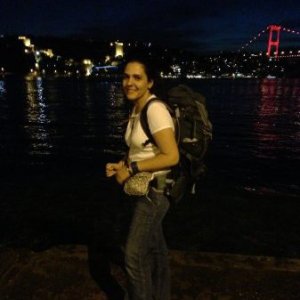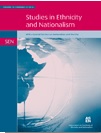Conflict Geographies of Pollution in Thrace Region of Turkey
Eda Acara
(Department of Geography, Queen’s University, Canada, 2015)
Adviser: Audrey Kobayashi
Dr. Eda Acara finished her Ph.D. at the Department of Geography in Queen’s University, Kingston, Ontario, Canada in May, 2015 and is currently a postdoctoral researcher in the Department of Urban Policy Planning and Local Governments at Middle East Technical University, Ankara, Turkey. She is also teaching part-time at Ankara University and Middle East Technical University. She was formerly trained as a sociologist at the Middle East Technical University and did her Master’s in Gender and Women’s Studies, a joint program at St. Mary’s University, Mount Saint University, and Dalhousie University in Halifax, Nova Scotia, Canada.
Dissertation abstract
This thesis addresses the tension between industrial development policies and environmental protection and the rising pollution levels in the City of Lüleburgaz in Thrace, a peripheral region of Istanbul, Turkey. The environmental narratives of second- and third- generation Muslim-Balkan immigrants, who began arriving in the early twentieth century, and Kurdish migrants, who arrived in Lüleburgaz in the post-1990 era, express conflict geographies of pollution across communities and between the communities and the state. Heavy pollution in the Ergene River, where the river is declared ‘dead,’ is not a mere accident but rather a facet of neoliberal environmental governance. By grappling with the question of how ‘the nation’ is continuously reterritorialised within neoliberalised constructions of environment and river politics at the community and policy realms, a politics of non-governance conflicting narratives of Muslim-Balkan immigrants and Kurdish migrants uncover multiple-layered conflict geographies of water pollution in Thrace region. Ethnic-class segregation leads to different community demands with regard to river pollution and environmental degradation in neighbourhoods characterised by different materialities of housing and occupation, a particular facet of non-governance that creates landscapes of invisibility. This analysis contributes to theories on ‘actually existing neoliberalism’ and the ways through which the nation and its various territorial practices at different epochs of neoliberalisation processes not only create consent for neoliberalisation practices but also give way for historical and racialised ethnic conflicts to survive.
Inspiration to undertake this research
My Ph.D. research emerged while I was writing my master’s thesis in Luleburgaz, Thrace region of Turkey. My thesis, A Case Study on the Discourse of Women’s Conscientious Objection in Turkey, was a feminist analysis of women’s conscientious objection to Turkish militarism.
At that time in Lüleburgaz, many of the participants associated water pollution in Ergene River (Thrace region of Turkey; Ergene River merges with the Maritza River which draws the border between Turkey, Greece and Bulgaria) with diverse economic, demographic, and cultural changes in the region.
One of the respondents in this research project, a Bulgarian-Turkish immigrant, related the worsening of the Ergene River basin to the degeneration of the Turkish-Bulgarian culture referring to the Kurdish labour migration as a threat to the environment. By instrumentalising the meaning of ‘environmental pollution’, this participant drew attention to the ethnic conflict between Bulgarian-Turkish immigrants and Kurdish immigrants who had come to Lüleburgaz to work in the industrial zones. This is when I began to wonder about the idea of ‘the nation’ and how it circulates in daily life across constructions of environment. Moreover, what are the consequences of this idea of ‘the nation’ and how widespread is it and in circulation with the neoliberalisation processes in Turkey. That is because the Thrace region, since the 1970s, has been one of the most important hinterland areas for the Istanbul city region to extract human and natural resources.
An in-depth look into one aspect of the dissertation
The Ergene River, a tributary of the Meriç River (Maritza in Bulgarian, Evros in Greek), crosses the border between Bulgaria, Greece, and Turkey in Thrace region. The Turkish Ministry of Environment (2004) considers it to be a ‘dead river,’ categorizing it to a level four.[1] The river has undergone rapid industrialisation and has suffered environmental consequences as a result. My research draws on the tension between industrial development policies and environmental protection and the rising pollution levels in the city of Lüleburgaz in Thrace region, a peripheral region of Istanbul, Turkey.
Within the context of neoliberal environmental governance, different ethnic communities have settled at different points in the industrialisation process where class and ethnic differences between the two ethnic communities create differential privileges and/or relative vulnerabilities. The environmental narratives of second- and third- generation Muslim-Balkan immigrants, who began arriving in the early twentieth century, and the Kurdish migrants, who arrived in Lüleburgaz in the post-1990 era, set in place conflict geographies of pollution across communities and between the communities, and the Turkish state, which has sought to regulate industry, pollution, and the environment.
With the aforementioned context in mind, I focus on the ethnic-class segregation between Kurdish and Muslim-Balkan immigrants at a specific neighbourhood in close vicinity to the Ergene River. A closer look at environmental- and water pollution-related problems in the Kurdish Quarter reveal that absence of infrastructure, in addition to flooding of the Lüleburgaz stream, have not been ‘seen’ by the Muslim-Balkan immigrants and the local and the central government agencies as an environmental problem. According to my Kurdish participants, the illegality of the Kurdish settlement is often given as a reason by the state institutions for the lack of infrastructural, water-treatment facilities and non-governance of these settlements for improvement of their environmental conditions.
It is possible to think of a state’s non-governance to what Prudham (2004) refers to as a neoliberal construction of ‘organized irresponsibility’?[2] The act of non-governance, I further argue, is a facet with respect to landscapes of invisibility, and thus racialised ethnic conflict together with neoliberalisation of the water sector in Turkey prepare the conditions for reterritorialisation of conflict geographies across river politics. This is why Kurdish people living in the neighbourhood have tended to abstain from taking collective action. As a community tactic to coexist with the Muslim-Balkan immigrants, the phenomenon also suggests the instrumentalisation of invisibility of the Kurdish people. That is also one of the ways through which neoliberalisation processes, which are not only limited by environmental politics but which are diffuse in other policies such as education and social assistance, are able to recreate ethnic-class polarisations. Thus, nationalism and neoliberalism comingle and function together to create obedience, in this case, through a community’s avoidance of being conspicuous in addressing pollution.
[1] This is the highest level of pollution, encompassing both surface and underground water pollution.
[2] Prudham (2004:345) argues that neoliberalism has a high potential to generate environmental catastrophes by ‘building organised irresponsibility into regulatory systems.’
Bibliography
Prudham, Scott. 2004. ‘Poisoning the Well: Neoliberalism and the Contamination of Municipal Water in Walkerton, Ontario.’ Geoforum 35:343–59.
Turkish Ministry of Environment and Forestry. 2004. ‘Çevre Atlası’ [Environmental Atlas]. In Ankara: Turkish Ministry of Environment and Forestry.
Perspective on the fields of nationalism, ethnicity, and race
I understand nationalism as ‘both a goal to achieve statehood and a belief in collective commonality’ (Nagel 1998:247). The first goal—achieving, maintaining, and exercising statehood—commonly involves armed conflict in the form of revolution or anti-colonial warfare; the second goal assures the imagination of a common national past and present (Anderson 1991). Furthermore, nationalism is more than a political ideology. It is a constitutive discourse, governing everyday relationships through reordering and governing the family, the relationships of members of the family with each other and the relationship of families with each other and with other institutions (Sirman 2007).
It is important to note that I specifically use the terminology and theories of racialisation in connection to ethnic nationalism within the context of Kurdish-Turkish conflict, as opposed to, for example, ethnicisation. I seek to expand on the meanings of racial vocabularies and discursivity of racialization (Ergin 2008) in connection with ethnic nationalism in Turkey. Simply because racialisation, as a concept provides opportunities to link multiple geographies of racism of Europe and Turkey so that it becomes possible to understand how Turkishness as well as Muslim-Balkan immigrants have been associated with whiteness and Turkish modernity, which is often at the heart of environmental narratives and understandings of urbanity. By this, racialisation of ethnicity as a conceptual framework also grasps ‘national framing of modernity’ (Wimmer and Nina Glick Schiller 2002:223).[1]
[1] Wimmer and Nina Glick Schiller (2002:223) argue that national framing of modernity refers to the separation between ‘the rise of nationalism from that of the modern state and democracy’ which ‘naturalize the nation-state.’
Bibliography
Anderson, Benedict R. O’G. 1991. Imagined Communities: Reflections on the Origin and Spread of Nationalism. Revised edition. London: Verso.
Ergin, Murat. 2008. ‘“Is the Turk a White Man?” Towards a Theoretical Framework for Race in the Making of Turkishness.’ Middle Eastern Studies 44(6):827–50.
Nagel, Joane. 1998. ‘Masculinity and Nationalism: Gender and Sexuality in the Making of Nations.’ Ethnic and Racial Studies 21(2):242–69.
Sirman, Nukhet. 2007. ‘Kadınlarin Milliyeti, Milliyetçilik’ [Women’s Nationality, Nationalism]. In Modern Türkiye’de Siyasi Düşünce Cilt 4 [Political Thought in Modern Turkey, Vol. 4], ed. Tanıl Bora and Murat Gültekingil. Istanbul: Iletişim Yayınları.
Wimmer, Andreas, and Nina Glick Schiller. 2002. ‘Methodological Nationalism and the Study of Migration.’ European Journal of Sociology 43(2):217–40.
Reflections on the job market
I have just moved into the job market after recently graduating in May, 2015. So, I am not so sure if anything I can provide would be truly accurate because of my limited experience.
If you recently defended a Ph.D. in the fields of nationalism, ethnicity, identity, and/or race and would like to be featured on our blog, please visit here for more information on how to submit your dissertation abstract.



